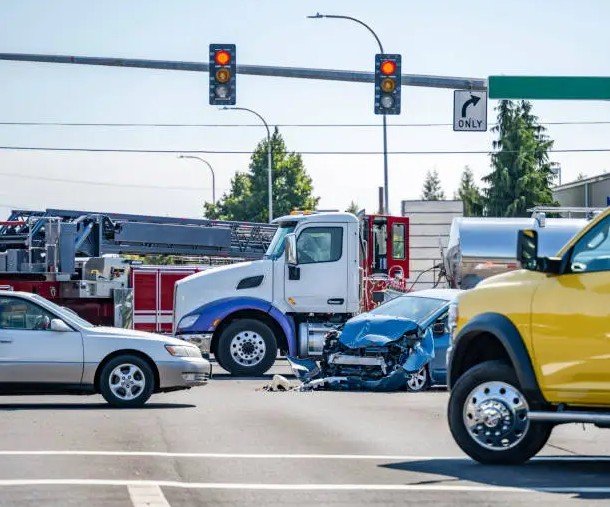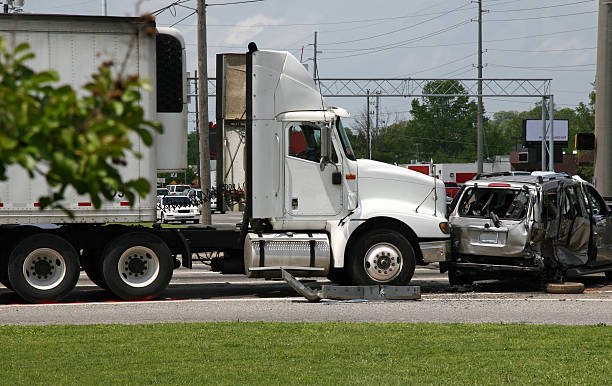Truck accidents in Texas are among the most devastating types of roadway crashes. With tens of thousands of commercial trucks crossing the state’s highways daily, the potential for catastrophic injuries and complex legal disputes is high. Understanding Texas truck accident law, including the deadlines, liability, and legal rights involved, is essential for any victim or family seeking justice.
This guide breaks down every major element of Texas truck accident law, offering clarity on what victims should know and how the legal process works.
- Brief Overview of Truck Accidents in Texas
- Statute of Limitations in Texas Truck Accident Cases
- Liability in Texas Truck Accidents
- Evidence That Strengthens Your Case
- Legal Differences Between Truck and Car Accidents
- Negligence & Comparative Fault in Texas
- Your Legal Rights After a Truck Accident
- Steps to Take After a Truck Accident
- Compensation in Texas Truck Accident Cases
- Resources and Legal Help for Truck Accidents in Texas
- Frequently Asked Questions (FAQs)
Brief Overview of Truck Accidents in Texas
Texas consistently ranks among the states with the highest number of commercial truck crashes in the U.S. According to data from the Texas Department of Transportation (TxDOT), over 22,000 significant truck accidents occur each year, leading to thousands of serious injuries and hundreds of fatalities.
What Vehicles Are Considered Trucks?
Under Texas law and federal definitions, “trucks” include:
18-wheelers and semi-trailers
Tanker trucks
Dump trucks
Delivery trucks and box trucks
Flatbeds and heavy haulers
Each vehicle type is subject to both Texas transportation laws and Federal Motor Carrier Safety Regulations (FMCSA).
Importance of Knowing Your Rights
Truck accident victims face insurance companies, corporate lawyers, and multiple parties trying to minimize liability. Knowing your rights ensures you can act quickly and make informed decisions to protect your compensation.
The Complexity of Commercial Truck Laws
Truck accident cases involve layers of state and federal regulations. Victims often deal with:
Multiple liable parties (driver, carrier, manufacturer)
Commercial insurance adjusters
Evidence stored in electronic logging devices (ELDs)
Legal deadlines that vary by case type
Statute of Limitations in Texas Truck Accident Cases

General Deadlines for Injury and Wrongful Death Claims
Under Texas Civil Practice and Remedies Code §16.003, you generally have two years from the date of a truck accident to file a personal injury or wrongful death lawsuit.
When the Clock Starts Ticking
The statute of limitations begins on the date of the accident or the date of death (in wrongful death cases). Once that time passes, victims lose their right to file a lawsuit.
Exceptions to the Rule
Some exceptions may extend or delay the filing period:
Victim is a minor or incapacitated
Defendant leaves the state after the accident
Accident involves a government-owned truck, requiring a notice of claim within six months under the Texas Tort Claims Act
Why Timing Is Critical
Trucking companies often preserve evidence only for a limited time. Acting fast ensures that critical records—such as maintenance logs, dashcam footage, and black box data—are not lost.
Related Articles:
- 20 Best Apps for Truck Drivers
- Is Lane Splitting Legal In Texas?
- Is It Illegal to Drive Barefoot in Texas?
- From Austin to Houston: 5 Car Safety Apps Every Texan Should Know
Liability in Texas Truck Accidents
Who Can Be Held Liable
Liability in a Texas truck accident can extend to:
The truck driver (for negligent or reckless operation)
The trucking company (due to poor supervision or unsafe practices)
The vehicle or parts manufacturer (for defective equipment)
The cargo loader or shipper (for improper loading)
Third-party maintenance contractors
Vicarious Liability and Employer Responsibility
Under the doctrine of respondeat superior, employers are legally responsible for the negligent actions of their employees performed during the course of employment. Trucking companies can also face direct negligence claims for unsafe hiring, poor training, or failure to maintain vehicles.
Multiple Defendants in a Single Claim
Truck accident lawsuits often name multiple defendants, which can complicate settlement negotiations. Each defendant may have separate insurance coverage and defence counsel.
Evidence That Strengthens Your Case

Winning a truck accident claim requires substantial evidence. Common forms include:
Dashcams
Video footage from vehicles or nearby surveillance cameras can establish fault and disprove false claims.
Black Box (ELD) Data
Most commercial trucks are equipped with electronic logging devices that record:
Speed
Braking activity
Hours of service
Engine status and GPS location
Driver Logs & Inspection Records
Federal law requires trucking companies to maintain driver logs, maintenance reports, and inspection records for limited periods. These can prove violations of FMCSA regulations.
Eyewitness Statements and Police Reports
Neutral witnesses and official crash reports from TxDOT can strengthen liability claims and help reconstruct the event timeline.
Legal Differences Between Truck and Car Accidents

Truck accidents differ from passenger car collisions in several critical ways:
Federal Regulations (FMCSA)
Truck drivers and companies must follow FMCSA safety standards, including:
Hour-of-service limits
Weight and cargo restrictions
Regular vehicle inspections
Bigger Damages and Higher Insurance Limits
Federal law requires commercial trucks to carry minimum liability coverage of $750,000 or more — significantly higher than standard auto insurance.
More Severe Injuries
Due to the size and weight of commercial trucks, crashes often result in catastrophic injuries like spinal damage, amputations, or fatalities.
More Complex Investigations
Multiple insurers, legal teams, and agencies (such as FMCSA or TXDOT) may be involved, leading to longer and more detailed investigations.
Related Articles:
- Best Truck Drivers Dating Websites and Apps
- 10 Apps to Hire a Truck Accident Lawyer in Texas Near You
- Is It Illegal to Drive Barefoot in Texas?
- DWI vs. DUI in Texas: What Are the Key Differences?
Negligence & Comparative Fault in Texas
Texas 51% Bar Rule
Texas applies a modified comparative negligence system under §33.001. Victims can recover damages only if they are less than 51% at fault.
Partial Fault and Its Effect on Compensation
If you’re partially responsible, your compensation is reduced by your percentage of fault.
Example: If awarded $200,000 but found 20% at fault, you’d receive $160,000.
How Fault Is Determined in Multi-Vehicle Accidents
Police reports, forensic reconstruction, and ELD data often determine comparative fault. Trucking companies may attempt to shift blame, making early legal representation vital.
Your Legal Rights After a Truck Accident

Right to Legal Representation
You have the right to hire an attorney who specializes in Texas truck accident law to protect your interests against corporate insurers.
Right to Fair Compensation
Victims can seek full compensation for both economic and non-economic damages caused by negligence.
Right to Refuse Initial Settlement Offers
Insurers often make low initial offers. Victims are not required to accept these and may pursue full compensation through negotiation or litigation.
When to Sue
If settlement talks stall or evidence shows gross negligence, your attorney may file a personal injury or wrongful death lawsuit in a Texas civil court.
Steps to Take After a Truck Accident
Taking the right steps after a truck crash could mean the difference between a denied claim and a successful settlement.
Get Medical Help – Always seek immediate medical attention, even for minor symptoms.
Report the Accident – Contact local police and request a TxDOT crash report.
Gather Evidence – Take photos, note witness details, and document vehicle positions.
Contact a Lawyer Before the Insurance – Speak to a truck accident attorney before giving any recorded statement to insurance adjusters.
Compensation in Texas Truck Accident Cases

Victims of truck accidents can recover compensation through two main categories:
Economic Damages
Medical bills and rehabilitation
Lost income and reduced earning capacity
Property repair or replacement
Non-Economic Damages
Pain and suffering
Emotional distress
Loss of enjoyment of life
Punitive Damages
When trucking companies or drivers act with gross negligence, Texas courts may award punitive damages to punish and deter similar behavior.
Resources and Legal Help for Truck Accidents in Texas

Truck accident laws in Texas are governed by state and federal regulations, but local resources and procedures vary by city.
To make things easier for victims and families, we’ve created city-by-city legal resource guides covering crash reports, police departments, TxDOT regional offices, and local legal aid organizations.
You can explore the resources below to find help nearest to you:
- Houston Truck Accident Legal Resources
- Dallas Truck Accident Legal Resources
- San Antonio Truck Accident Legal Resources
- Fort Worth Truck Accident Legal Resources
- Austin Truck Accident Legal Resources
- El Paso Truck Accident Legal Resources
- Arlington Truck Accident Legal Resources
- Corpus Christi Truck Accident Legal Resources
Each of these guides lists where to file crash reports, contact local law enforcement, locate TxDOT field offices, and connect with trusted Texas truck accident attorneys serving your city.
Frequently Asked Questions (FAQs)
Can I sue the trucking company directly?
Yes. Victims can file claims against the trucking company for negligent hiring, training, or supervision, and for vicarious liability for their driver’s actions.
What if I were partially at fault?
You can still recover compensation if you were less than 51% responsible, though your award will be reduced accordingly.
How long do I have to file a truck accident lawsuit in Texas?
You have 2 years from the accident date to file a claim in Texas under Civil Practice & Remedies Code §16.003.
Who can be held liable in a Texas truck accident?
Truck drivers, trucking companies, parts manufacturers, cargo loaders, or even contractors may share liability.
What compensation can I receive after a truck accident in Texas?
Victims may recover economic, non-economic, and punitive damages depending on the severity and cause of the crash.
Do I need a lawyer for a Texas truck accident claim?
Yes. Trucking companies and insurers have strong legal teams — hiring a specialized attorney levels the field.
Is there a difference if the truck was from another state?
No. Federal laws apply to all interstate carriers operating in Texas, but jurisdiction may influence where the case is filed.
Do truckers have to follow both state and federal law?
Yes. Truckers must comply with both Texas Department of Public Safety regulations and Federal Motor Carrier Safety Administration (FMCSA) standards.
How long does a truck accident lawsuit take?
Most Texas truck accident lawsuits take 6 months to 2 years, depending on complexity, injuries, and negotiations.
How long after an accident can you file a claim?
You can file any time within two years, but it’s best to start as soon as possible to preserve evidence.
Do you have to file a claim after an accident?
Yes. Texas law requires reporting and filing a claim for injury or property damage over $1,000.
Certified tech nerd 🤓 and researcher. I split my time between digging into gadgets ⚙️ and decoding the legal landscape of transportation safety ⚖️.
When I’m not focused on consumer rights, you can find me lifting weights 🏋️♂️, gaming 🎮, reading 📚, or vibing with the crew 🤘.





